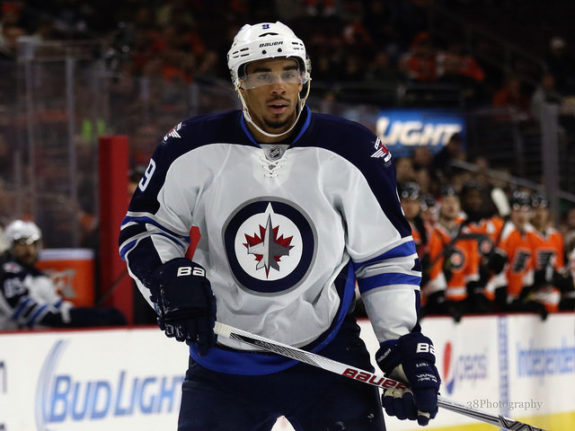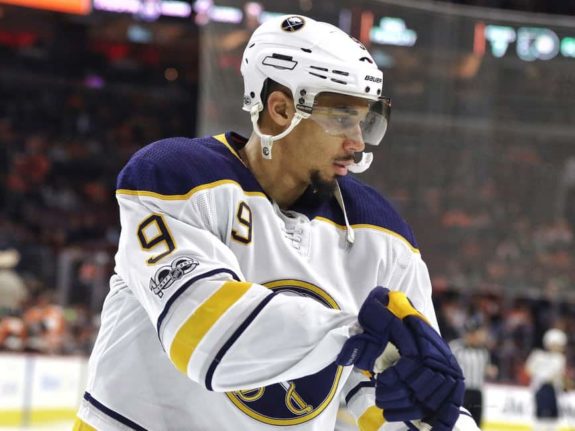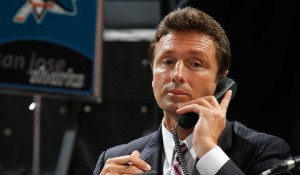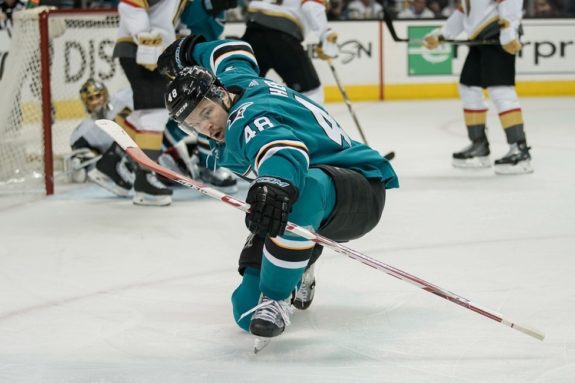Count me among the miffed. The San Jose Sharks signed Evander Kane to a contract for seven years reported at $7 million per season.
On one level, Kane’s talent, it is a good deal. But on other levels, it is puzzling.
Kane’s Toxic Perception
Kane has had issues off the ice, issues with his teams and issues on the ice. While some may consider these unimportant, they clearly matter to the league’s general managers. Given his potential to be a major difference maker in the playoffs, Kane was available for a shockingly low cost at the trade deadline.
In the eyes of the league’s GMs (at least among playoff contending teams), Kane was toxic. What part of Kane was toxic may have differed from GM to GM, but only one offered the Buffalo Sabres anything for Kane. The Sharks offered a second-rounder (with potential to become a lottery-protected first if the Sharks re-signed Kane), a fourth-rounder and a marginal NHL player. This for a player selected fourth overall in the 2009 draft. And to be clear, Kane has the elite talent consistent with his draft spot.

The entire league knows Kane is an enormous talent. A trade-deadline move for Kane represented low risk since the money involved was very modest and the term very short. Yet the entire league, with one exception, took a pass on bringing him on board.
Kane Changes in San Jose?
A stint measured in weeks is inherently low-risk. A stint measured in years, not so.
Kane’s injury history probably didn’t hang up general managers back in February since he was healthy at the time and the deal was for a short term. But it is an issue to consider for long-term contracts. With Kane, injury risk is a major consideration (more detail in my notes below).
All this makes it fair to ask: did Kane’s 10 weeks in San Jose cause a lot of general managers to reconsider their opinion of Kane?
In those ten weeks, Kane suffered two injuries which rendered him ineffective (especially in the second round of the playoffs where he had just one goal and was minus-5). Did injury concerns diminish during Kane’s time in San Jose? Obviously not.
He also was suspended for a playoff game for a cross-check to the face of Vegas’ Pierre-Edouard Bellemare. Did the concerns about Kane’s ability to maintain self-discipline disappear? Obviously not.
I doubt a single GM was surprised by Kane’s productivity in San Jose when healthy, which was maybe six weeks out of the 10. His ability has never been in question.
A One-Man Bidding War?
In 10 weeks, were the things which Kane did in San Jose likely to change perceptions built up over nine seasons? It’s doubtful. Good when healthy, but also two injuries and a suspension. Kane’s time in San Jose reinforces perceptions, including the perceived risks.

All this begs the question: Who was Sharks GM Doug Wilson bidding against? It is unlikely Kane was going to benefit from a major bidding war for his services. And yet, Wilson paid full value and then some for Kane. I’d suggest Kane for one year is worth $8 million, but because of the longer term risks involved, I’d drop his compensation by about $400,000 for each additional year. A four-year deal at $6.8 million per season or a five-year deal at $6.4 million would be the sweet spots.

Kane has had plenty of unpleasant experiences in the league, but he seemed to appreciate his time in San Jose. While the idea of a taking a “hometown discount” following a trade deadline acquisition is a stretch, there’s a lot to be said for a player who found himself in a good place for the first time in his career. While a “hometown discount” doesn’t apply, a “right-town discount” probably could. Of course, Kane has felt at home in other places before, too. But it didn’t last.
Free Agency Ramifications
The Kane signing has one other tangible near-term impact. The once plentiful Sharks cap space has been reduced by a lot. This limits their ability to pursue the one player who might hit the market and is even more talented than Kane. This is John Tavares and he’s a piece the Sharks need more than Kane. They can certainly pursue Tavares – and Kane’s addition is a selling point. The Sharks will be an enormously talented team if Tavares signs on. But if it’s about money to (to some extent, it surely is), the Sharks are more likely to tap out of a bidding war for Tavares, even after shedding several salaries.
Kane’s Future
The longer term all comes down to Kane’s ability to avoid the sorts of character issues he’s had in the past plus his ability to stay healthy. One hopes the character issues are a thing of the past (the San Jose area is not a forgiving one on this front).
But I can’t get past the health issues. A colleague forwarded me a pair of comparable names who signed long-term deals at roughly the same age as Kane. And both deals look like enormous busts based on their first couple years. Kane has all the earmarks of a player who gets ‘old’ at a young age.
It is important to understand this: with a healthy Evander Kane during the playoffs, the Sharks are probably still playing. Kane is a power forward, and the Sharks’ most effective players in the playoffs were their power forwards. But alas, Kane wasn’t healthy and it showed. I like the team’s power forward make-up with Kane, Timo Meier and Tomas Hertl.

Health is the crux of the issue. The Sharks’ signing of Kane is about going deep in the playoffs, yet Kane’s history says he usually is not healthy in April (more in the notes below). If he isn’t healthy in April, how is he going to help them win in May and June?
I understand the reward potential with Kane. In a recent article, I indicated Kane has $9-million talent. But talent is only part of the equation. The bidding for Kane’s services would be tepid at best – the league’s GMs weren’t interested in him in the lowest-risk case. Longer-term, Kane is risky on several important fronts. I remain miffed at the combination of money and length of the deal.
Zeke’s Notes
• Kane’s durability was a big part of the piece, so I’ll provide some background here in the notes.
San Jose is accustomed to having some of the league’s most durable players. Joe Pavelski, Joe Thornton, Patrick Marleau and Brent Burns have missed minimal time with San Jose. Each has several season of playing every game. Marleau’s consecutive-games streak is in the top 10 all-time. Prior to the knee injury late last season, Thornton missed nine games in 11 seasons. Pavelski has missed one game in seven seasons. Burns played every game for four consecutive seasons.
Marc-Edouard Vlasic and Justin Braun have been durable, too. Vlasic has seven seasons of 80 or more regular-season games, and Braun has done this four times in the last five seasons.
Of the Sharks’ top-tier players, only two have meaningful injury histories. Logan Couture has missed 65 games in his eight seasons as line-up regular. Tomas Hertl, who has had substantial injury problems, has missed 82 games in his five-year career.
In the eight-season overlap between Couture and Kane, Kane has missed twice as many games as Couture. In the five-season overlap with Hertl, Kane has missed 97 games, 15 more than Hertl.
Kane’s history also says he doesn’t finish the regular season healthy. In 2014-15, Kane’s season ended in February. In 2015-16, he didn’t play in April. This season, he missed a pair of games in April and was clearly a diminished player in the playoffs. In three of the last four seasons, Kane was not (or could not) have been a difference-maker in the playoffs.
• Down Goes Brown has power rankings for Tavares’s most likely destinations. His current team, the New York Islanders, tops the list. Among the four other teams, the Sharks stand out. Toronto has long-term cap challenges (think Auston Matthews’ next deal, among others), and their far bigger issues are on defense. The two other teams listed are Carolina and Montreal. Both teams are in flux. In Carolina, the entire management structure has been upended. In Montreal, people wonder why their management structure hasn’t been.